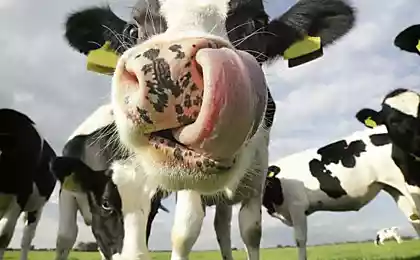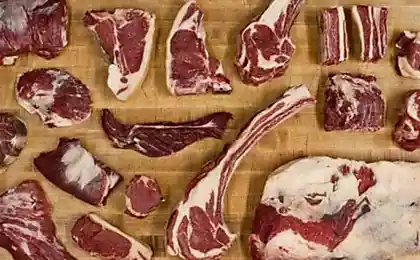624
Our ancestors did not eat meat
Anthropologists claim that man walked away from a plant-based diet and began to eat meat since the last ice age, when ordinary food, consisting of fruits, nuts and vegetables became unavailable, ancient people had to eat meat in order to survive.
Not long ago, many scientists came to the conclusion that our ancestors were vegetarians who do not use meat, except during emergency crises (when plant foods were not available).
Fourteen million one hundred twenty two thousand three hundred ninety seven
Unfortunately, the habit of eating meat is preserved after the end of the ice age — either out of necessity (as the Inuit and tribes living in the far North) or because of tradition and ignorance. But often, preserved habits — just a misunderstanding.
Over the last fifty years by well-known experts in the field of health, nutritionists and biochemists have found compelling evidence: in order to stay healthy, it is not necessary to eat meat, even on the contrary — the diet acceptable to the predators able to harm a person.
According to the theory of the Hyperborean origin of the whites, we can safely say that initially do all the people on earth did not consume foods of animal origin. Natural and climatic conditions were favorable for the growth of plant substitutes for meat food. In our time, like the plants and the fruit remains, but in small quantities. Even now, in more severe climatic conditions, nature does not forget his children and provides for their "daily bread".
Hunt invented when climate changes destroyed the food sources in the Northern regions during the glacial period. But from the point of view of the evolution of all this happened recently, and our bodies are still vegetarian. In fact, until the mid-twentieth century, meat was mainly the prerogative of the rich and having the power, the peasants ate meat only during certain religious holidays, maybe three or four times a year. But because the rich ate meat, he became associated with wealth and gradually other people began to imitate the rich. Ethics ruling elite always becomes the ethics of society as a whole.
The ancient Greeks, Egyptians and Jews considered fruit the main part of the diet. The priests of Ancient Egypt never ate meat. Such great Greek philosophers as Plato, Socrates and Pythagoras were active in defense of vegetarianism.
Plutarch writes in his treatise "On eating meat", "Can you really ask from what motives Pythagoras abstained from meat-eating? For my part, I ask the question, under what circumstances and in what mental state people first decided to try the taste of blood, stretch the lips to the flesh of a corpse and decorate your table with dead, decaying bodies, and then he allowed himself to call it food pieces that shortly before this, still mooing and bleating, moved and lived... For the flesh we steal from them the sun, light and life, to which they are entitled at birth."
Then Plutarch poses a major challenge for meat-eaters: "If you have now had a desire to say that this food was given to you by nature, then kill yourself what you want to eat and do so that you have by nature, but not a butcher's knife, cudgel or axe.
What is the struggle for existence or some uncontrollable madness forced you to stain your hands with blood in order to eat animals? 3ачем you are enjoying all facilities and all amenities of existence do it? 3ачем slander you on the ground, as if she is unable without animal flesh to nourish you?»
Vegetarianism was common among the greatest civilizations of the Indians of the Incas. The Taoists of Ancient China were also vegetarians. There are also credible allegations that the bulk of the human race that is earlier than the current time, ate entirely or mostly plant food.
Tribes who ate exclusively meat and other animal food, were very rare or did not exist. Even the Eskimos eat twenty-four different types of moss and plants growing in the Arctic, including cloudberry, barberry, Veronika, reindeer moss, and others. At the same time, people probably eat more meat than in any other period of history.
You can trace this feature in the history of civilization was based on vegetarianism, agriculture and horticulture, while the tribes that depend on hunting and herding activities were not created civilizations.
"When I have made a digression, writes Higgins in "Apocalypse II" (p. 147), in the most distant antiquity, I have found clear and specific evidence the following important points: first, animal food is not consumed, and secondly, none of the animals were not sacrificed". Christian theologian and philosopher Origen (C. 184 — 253) writes that "the Egyptians would prefer to die than to be accused of such a crime, as the use of meat".
The ancient Greek historian Herodotus (484 BC — 425 BC, the famous description of the customs of different Nations, as well as a detailed history of the Greco-Persian wars, was the first serious historian of Ancient Greece, known as the father of history), wrote that the Egyptians existed on fruits and vegetables that are consumed raw.
This is confirmed by Pliny the Elder (23-79 CE, the author of natural history books XXXVII. 77 ad): "ISIS, one of the most beloved goddesses of the Egyptians, taught them [as they believed] the art of baking bread from grain before grew wild. However, in the earlier period the Egyptians lived on fruits, roots and plants. The goddess ISIS was worshipped everywhere in Egypt, in her honour was built the magnificent temples. Its priests are sworn to purity, were required to wear linen garments unmixed with animal fibre, to abstain from animal food, and vegetables, were regarded as unclean, beans, garlic, regular onions and leeks".
In Iceland, lived tribes that are not consuming food. They now have the nation who abstain from meat for religious reasons. The same we find in China, India, Turkey, ancient Palestine.
Ancient civilizations of the East had designed systems of healing, an important part which was the food system. It is noteworthy that the ancient Eastern medicine, who had much more experience than the Western, is still unequivocally recommends plant-based diet.
The ancient system of healing created in India, is Hatha yoga, the origin of which belong to the II Millennium BC; according to some sources, yoga appeared earlier, in the sixth Millennium BC Hatha yoga is the most popular hygienic system in the world. Central yoga takes spiritual and physical exercises. However, it is necessary to remind that yoga, as a system of moral and physical perfection, does not allow the consumption of meat products. As a rationale of the prohibition to eat meat yoga helps the argument that along with meat of the killed animal to human transferred disease and suffering of the animal.
In addition to yoga in Ancient India there were other guidance on recovery. Indian sacred literature relating to the II — beginning of I century BC, contains a book called Ayurveda ("Science of long life"). It is a scientific treatise on methods of treatment, which also contains detailed instructions on how to eat right. In Ancient India was formulated ethical, occult, hygienic and physiological principles, according to which man is forbidden to kill animals and consume meat. It was thought that carnivorous food makes people stupid and animal-like (aggressive, angry, mentally unbalanced); eating meat cannot become a philosopher, a wise man; the intellect becomes clear, and becomes thin and is exacerbated due to plant foods. Plant foods, according to teachers of the East, is highly conducive to sublime thinking and divine contemplation. It gives more vitality than animal food. Extremely useful fresh fruit, salads and raw vegetables, cheese, nuts, barley, honey, dates, almonds. From raw food improves the quality of blood, and therefore it should be 80% of the food.
John Harvey Kellogg, American surgeon, stated: "the Flesh is not an optimal food for humans and historically were not included in the diet of our ancestors. The meat is secondary, derivative, since all food comes originally flora. In meat and animal products there is nothing useful or indispensable for the human body, which it would be impossible to find in plant foods. A dead cow or sheep lying in a meadow, called carrion. The same corpse, embellished and hung in the butcher shop, runs through the category of delicacies! Careful microscopic examination will show only minimal differences between the carcass under the fence and carcass in meat shop (or complete lack thereof). Both are teeming with pathogenic bacteria and exude a putrid smell".
Leo Tolstoy, the famous Russian writer, stated: "there Was a time when people ate each other; the time came when they ceased to do it, but still continue to eat animals. Now it's the time when people are becoming more and more quit this terrible habit."
"Cannibals come out to hunt, track down and kill his victim — another person, then fried and eat it, just like they would any other game. There is not a single fact, not a single argument in justification of meat-eating, which could not be used to justify cannibalism". Herbert Shelton, a famous American naturopath doctor ("the Perfect food»)
"Apologize for those pathetic creatures who first resorted to meat-eating, can serve as a complete absence and lack of funds for life, as they (primitive peoples) acquired the bloodthirsty habits of indulging their own lusts and not to indulge in lust among the "abnormal" excess of everything required and need. But what can justify us in our time?» Plutarch
In the ancient Scriptures of the Hindus is a very remarkable statement about the fact that even in India some of the lower castes in the early period we started to eat meat. It says that in ancient times there were only three diseases, one of which was old age, but now, when people began to eat meat, originated 78 new diseases.
The understanding that illnesses can occur from eating of carrion, have existed for thousands of years. In the Vedic period (the days of pagan Russia) the people in charge of the destiny of different creatures. All animals have served humans. Feeding of animals people didn't bother — they fed him. Pets and people in the Vedic period was a vegetarian and never ate meat even could not conceive of such food. Animals Gentile friends. And diet their daily food was varied, but it consisted only of the plant. The people of the whole of pagan Rus eat easily digestible nutritious food. Food meat introduced into the world of nomads. The deserts they could find little to eat. That's because the nomads and cattle killed. And ate the flesh of those animals, that they together endured the hardships of the nomadic, carried their belongings, feeding milk, giving clothes for their fur.
"Veles book", a complex and voluminous source of the ancient Slavs, the authorship of which is attributed to the Novgorod priests, confirms that the Slavs were people of Vedic culture, related to culture and beliefs of ancient India, the ancestral home of the Slavs is the seven rivers, that is, Kulu valley, surrounded by the peaks of the Himalayas.
This evidence indicates that the Slavs really could be vegetarian, as the ancient Vedic texts, preserved in the homeland of Slavs (present-day India), indicate the necessity of vegetarianism, both for body and for spirit.
"Veles book" — a source of ancient knowledge about dolgovoi Russia, the monument to the Vedic culture of the Slavs who denies a well-established scientific views, as well as the Indian Vedic texts. "Veles book" tells the story of a centuries-old pre-Christian era the Eastern Slavs and their relations with the Greeks, Goths, Huns and many other peoples. This book gives another argument in favor of the release of Central Asian steppe origin of our ancestors. The date of the facts "book of Veles" coincide with the data of historical science that confirms the authenticity of the book.
Source: sonboga.ru/article/nashi-predki-ne-eli-myaso
Not long ago, many scientists came to the conclusion that our ancestors were vegetarians who do not use meat, except during emergency crises (when plant foods were not available).
Fourteen million one hundred twenty two thousand three hundred ninety seven
Unfortunately, the habit of eating meat is preserved after the end of the ice age — either out of necessity (as the Inuit and tribes living in the far North) or because of tradition and ignorance. But often, preserved habits — just a misunderstanding.
Over the last fifty years by well-known experts in the field of health, nutritionists and biochemists have found compelling evidence: in order to stay healthy, it is not necessary to eat meat, even on the contrary — the diet acceptable to the predators able to harm a person.
According to the theory of the Hyperborean origin of the whites, we can safely say that initially do all the people on earth did not consume foods of animal origin. Natural and climatic conditions were favorable for the growth of plant substitutes for meat food. In our time, like the plants and the fruit remains, but in small quantities. Even now, in more severe climatic conditions, nature does not forget his children and provides for their "daily bread".
Hunt invented when climate changes destroyed the food sources in the Northern regions during the glacial period. But from the point of view of the evolution of all this happened recently, and our bodies are still vegetarian. In fact, until the mid-twentieth century, meat was mainly the prerogative of the rich and having the power, the peasants ate meat only during certain religious holidays, maybe three or four times a year. But because the rich ate meat, he became associated with wealth and gradually other people began to imitate the rich. Ethics ruling elite always becomes the ethics of society as a whole.
The ancient Greeks, Egyptians and Jews considered fruit the main part of the diet. The priests of Ancient Egypt never ate meat. Such great Greek philosophers as Plato, Socrates and Pythagoras were active in defense of vegetarianism.
Plutarch writes in his treatise "On eating meat", "Can you really ask from what motives Pythagoras abstained from meat-eating? For my part, I ask the question, under what circumstances and in what mental state people first decided to try the taste of blood, stretch the lips to the flesh of a corpse and decorate your table with dead, decaying bodies, and then he allowed himself to call it food pieces that shortly before this, still mooing and bleating, moved and lived... For the flesh we steal from them the sun, light and life, to which they are entitled at birth."
Then Plutarch poses a major challenge for meat-eaters: "If you have now had a desire to say that this food was given to you by nature, then kill yourself what you want to eat and do so that you have by nature, but not a butcher's knife, cudgel or axe.
What is the struggle for existence or some uncontrollable madness forced you to stain your hands with blood in order to eat animals? 3ачем you are enjoying all facilities and all amenities of existence do it? 3ачем slander you on the ground, as if she is unable without animal flesh to nourish you?»
Vegetarianism was common among the greatest civilizations of the Indians of the Incas. The Taoists of Ancient China were also vegetarians. There are also credible allegations that the bulk of the human race that is earlier than the current time, ate entirely or mostly plant food.
Tribes who ate exclusively meat and other animal food, were very rare or did not exist. Even the Eskimos eat twenty-four different types of moss and plants growing in the Arctic, including cloudberry, barberry, Veronika, reindeer moss, and others. At the same time, people probably eat more meat than in any other period of history.
You can trace this feature in the history of civilization was based on vegetarianism, agriculture and horticulture, while the tribes that depend on hunting and herding activities were not created civilizations.
"When I have made a digression, writes Higgins in "Apocalypse II" (p. 147), in the most distant antiquity, I have found clear and specific evidence the following important points: first, animal food is not consumed, and secondly, none of the animals were not sacrificed". Christian theologian and philosopher Origen (C. 184 — 253) writes that "the Egyptians would prefer to die than to be accused of such a crime, as the use of meat".
The ancient Greek historian Herodotus (484 BC — 425 BC, the famous description of the customs of different Nations, as well as a detailed history of the Greco-Persian wars, was the first serious historian of Ancient Greece, known as the father of history), wrote that the Egyptians existed on fruits and vegetables that are consumed raw.
This is confirmed by Pliny the Elder (23-79 CE, the author of natural history books XXXVII. 77 ad): "ISIS, one of the most beloved goddesses of the Egyptians, taught them [as they believed] the art of baking bread from grain before grew wild. However, in the earlier period the Egyptians lived on fruits, roots and plants. The goddess ISIS was worshipped everywhere in Egypt, in her honour was built the magnificent temples. Its priests are sworn to purity, were required to wear linen garments unmixed with animal fibre, to abstain from animal food, and vegetables, were regarded as unclean, beans, garlic, regular onions and leeks".
In Iceland, lived tribes that are not consuming food. They now have the nation who abstain from meat for religious reasons. The same we find in China, India, Turkey, ancient Palestine.
Ancient civilizations of the East had designed systems of healing, an important part which was the food system. It is noteworthy that the ancient Eastern medicine, who had much more experience than the Western, is still unequivocally recommends plant-based diet.
The ancient system of healing created in India, is Hatha yoga, the origin of which belong to the II Millennium BC; according to some sources, yoga appeared earlier, in the sixth Millennium BC Hatha yoga is the most popular hygienic system in the world. Central yoga takes spiritual and physical exercises. However, it is necessary to remind that yoga, as a system of moral and physical perfection, does not allow the consumption of meat products. As a rationale of the prohibition to eat meat yoga helps the argument that along with meat of the killed animal to human transferred disease and suffering of the animal.
In addition to yoga in Ancient India there were other guidance on recovery. Indian sacred literature relating to the II — beginning of I century BC, contains a book called Ayurveda ("Science of long life"). It is a scientific treatise on methods of treatment, which also contains detailed instructions on how to eat right. In Ancient India was formulated ethical, occult, hygienic and physiological principles, according to which man is forbidden to kill animals and consume meat. It was thought that carnivorous food makes people stupid and animal-like (aggressive, angry, mentally unbalanced); eating meat cannot become a philosopher, a wise man; the intellect becomes clear, and becomes thin and is exacerbated due to plant foods. Plant foods, according to teachers of the East, is highly conducive to sublime thinking and divine contemplation. It gives more vitality than animal food. Extremely useful fresh fruit, salads and raw vegetables, cheese, nuts, barley, honey, dates, almonds. From raw food improves the quality of blood, and therefore it should be 80% of the food.
John Harvey Kellogg, American surgeon, stated: "the Flesh is not an optimal food for humans and historically were not included in the diet of our ancestors. The meat is secondary, derivative, since all food comes originally flora. In meat and animal products there is nothing useful or indispensable for the human body, which it would be impossible to find in plant foods. A dead cow or sheep lying in a meadow, called carrion. The same corpse, embellished and hung in the butcher shop, runs through the category of delicacies! Careful microscopic examination will show only minimal differences between the carcass under the fence and carcass in meat shop (or complete lack thereof). Both are teeming with pathogenic bacteria and exude a putrid smell".
Leo Tolstoy, the famous Russian writer, stated: "there Was a time when people ate each other; the time came when they ceased to do it, but still continue to eat animals. Now it's the time when people are becoming more and more quit this terrible habit."
"Cannibals come out to hunt, track down and kill his victim — another person, then fried and eat it, just like they would any other game. There is not a single fact, not a single argument in justification of meat-eating, which could not be used to justify cannibalism". Herbert Shelton, a famous American naturopath doctor ("the Perfect food»)
"Apologize for those pathetic creatures who first resorted to meat-eating, can serve as a complete absence and lack of funds for life, as they (primitive peoples) acquired the bloodthirsty habits of indulging their own lusts and not to indulge in lust among the "abnormal" excess of everything required and need. But what can justify us in our time?» Plutarch
In the ancient Scriptures of the Hindus is a very remarkable statement about the fact that even in India some of the lower castes in the early period we started to eat meat. It says that in ancient times there were only three diseases, one of which was old age, but now, when people began to eat meat, originated 78 new diseases.
The understanding that illnesses can occur from eating of carrion, have existed for thousands of years. In the Vedic period (the days of pagan Russia) the people in charge of the destiny of different creatures. All animals have served humans. Feeding of animals people didn't bother — they fed him. Pets and people in the Vedic period was a vegetarian and never ate meat even could not conceive of such food. Animals Gentile friends. And diet their daily food was varied, but it consisted only of the plant. The people of the whole of pagan Rus eat easily digestible nutritious food. Food meat introduced into the world of nomads. The deserts they could find little to eat. That's because the nomads and cattle killed. And ate the flesh of those animals, that they together endured the hardships of the nomadic, carried their belongings, feeding milk, giving clothes for their fur.
"Veles book", a complex and voluminous source of the ancient Slavs, the authorship of which is attributed to the Novgorod priests, confirms that the Slavs were people of Vedic culture, related to culture and beliefs of ancient India, the ancestral home of the Slavs is the seven rivers, that is, Kulu valley, surrounded by the peaks of the Himalayas.
This evidence indicates that the Slavs really could be vegetarian, as the ancient Vedic texts, preserved in the homeland of Slavs (present-day India), indicate the necessity of vegetarianism, both for body and for spirit.
"Veles book" — a source of ancient knowledge about dolgovoi Russia, the monument to the Vedic culture of the Slavs who denies a well-established scientific views, as well as the Indian Vedic texts. "Veles book" tells the story of a centuries-old pre-Christian era the Eastern Slavs and their relations with the Greeks, Goths, Huns and many other peoples. This book gives another argument in favor of the release of Central Asian steppe origin of our ancestors. The date of the facts "book of Veles" coincide with the data of historical science that confirms the authenticity of the book.
Source: sonboga.ru/article/nashi-predki-ne-eli-myaso
8 solutions for healthy relationships
In San Francisco sea birds dying from a mysterious transparent mass.























